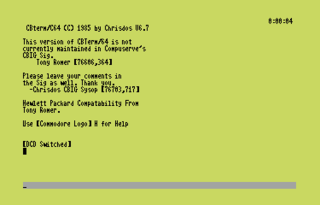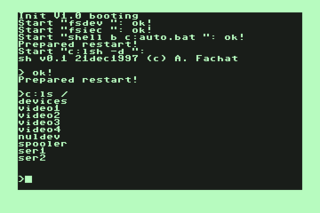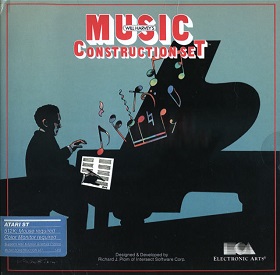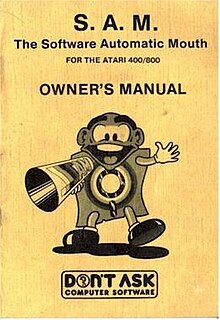 W
WCBterm/C64, commonly referred to as CBterm, is a terminal emulator for the Commodore 64, authored by Christopher "Chrisdos" Dunn.
 W
WContiki is an operating system for networked, memory-constrained systems with a focus on low-power wireless Internet of Things devices. Extant uses for Contiki include systems for street lighting, sound monitoring for smart cities, radiation monitoring, and alarms. It is open-source software released under a BSD license.
 W
WThe Commodore 64 (C64) demos are demonstrations of what can be done to push the limits of the Commodore 64 computer, made by programmers, musicians and artists.
 W
WThe DTJ-BBS was a program for the Commodore 64 written by Andrew Bernhardt. The first version was released in 1985, and sold for $35. There were forty DTJ systems before the software changed to freeware in 1989.
 W
WCommodore DOS, also known as CBM DOS, is the disk operating system used with Commodore's 8-bit computers. Unlike most other DOSes, which are loaded from disk into the computer's own RAM and executed there, CBM DOS is executed internally in the drive: the DOS resides in ROM chips inside the drive, and is run there by one or more dedicated MOS 6502 family CPUs. Thus, data transfer between Commodore 8-bit computers and their disk drives more closely resembles a local area network connection than typical disk/host transfers.
 W
WFast Hack'em is a Commodore 64 fast disk/file copier, nibbler and disk editor written by Mike J. Henry and released in 1985. It was distributed in the U.S. and Canada via Henry's "Basement Boys Software", and in the U.K. via Datel Electronics. In the U.S., it retailed for $29.95.
 W
WA fast loader is a software program for a home computer, such as the Commodore 64 or ZX Spectrum, that accelerates the speed of file loading from floppy disk or compact cassette.
 W
WGarry Kitchen's GameMaker is an integrated development environment for the Commodore 64, Apple II, and IBM PCs, created by Garry Kitchen and released by Activision in 1985. It is one of the earliest all-in-one game design products aimed at the general consumer, preceded by Broderbund’s The Arcade Machine in 1982. Several sample files are included: a demo sequence featuring animated sprites and music, a recreation of Pitfall!, and a birthday greeting.
 W
WGeckOS is an experimental operating system for MOS 6502 and compatible processors.
 W
WgeoPublish is a desktop publishing program designed by Berkeley Softworks for the GEOS environment.
 W
WGEOS is a discontinued operating system from Berkeley Softworks. Originally designed for the Commodore 64 with its version being released in 1986, enhanced versions of GEOS later became available in 1987 for the Commodore 128 and in 1988 for the Apple II family of computers. A lesser-known version was also released for the Commodore Plus/4.
 W
WInvade-a-Load was a fast loader routine used in software for Commodore 64 computer. It was used in commercial computer games that were stored on Compact Cassette tape and loaded using the Datassette.
 W
WThe Kawasaki Synthesizer is a musical software tool for the Commodore 64 created in 1983 by Japanese jazz musician, Ryo Kawasaki. The first of four music programs created by Kawasaki, Kawasaki Synthesizer (1983) was followed by Kawasaki Rhythm Rocker (1984), Kawasaki Magical Musiquill (1985), and Kawasaki MIDI Workstation in 1986.
 W
WLUnix, short for "Little Unix", is a Unix-like multi-tasking operating system designed to run natively on the Commodore 64 and Commodore 128 home computer systems. It supports TCP/IP networking. Unlike most Unix-like systems, LUnix is written in 6502 assembly language instead of C.
 W
WMini Office II, published by Database Software in 1986, was an office suite available for several home computers, among which were the Amstrad CPC, the Atari 8-bit family, the BBC Micro, the Commodore 64, and others. The software package could be purchased on cassette tape or floppy disk. Mini Office II was originally written for the BBC Micro Computer and was also available in EPROM format.
 W
WMultiplan was an early spreadsheet program developed by Microsoft. Known initially by the code name "EP", it was introduced in 1982 as a competitor for VisiCalc.
 W
WWill Harvey's Music Construction Set (MCS) is a music composition notation program designed by Will Harvey for the Apple II and published by Electronic Arts in 1984. Harvey wrote the original Apple II version in assembly language when he was 15 and in high school. MCS was conceived as a tool to add music to his first and only published software, an abstract shooter called Lancaster for the Apple II.
 W
WPaperClip is a word processor for the Commodore 64, 128, and Atari 8-bit family published by Batteries Included in 1985. In the United Kingdom it was published by Ariolasoft.
 W
WThe Quill is a program to write home computer adventure games. Written by Graeme Yeandle, it was published on the ZX Spectrum by Gilsoft in December 1983. Although available to the general public, it was used by several games companies to create best-selling titles; over 450 commercially published titles for the ZX Spectrum were written using The Quill.
 W
WSimons' BASIC was an extension to BASIC 2.0 for the Commodore 64 home computer. Written by British programmer David Simons in 1983, who was then just 16 years old at the time, it was distributed by Commodore in cartridge format.
 W
WSoftware Automatic Mouth, or S.A.M., is a speech synthesis program developed by Mark Barton and sold by Don’t Ask Software. The program was released for the Atari 8-bit family, Apple II, and Commodore 64. Released in 1982, it was one of the first commercial all-software voice-synthesis programs.
 W
WSpeedScript is a word processor originally printed as a type-in machine language listing in 1984-85 issues of Compute! and Compute!'s Gazette magazines. Approximately 5 KB in length, it provided many of the same features as commercial word processing packages of the 8-bit era, such as PaperClip and Bank Street Writer. Versions were published for the Apple II, Commodore 64 and 128, Atari 8-bit family, VIC-20, and MS-DOS.